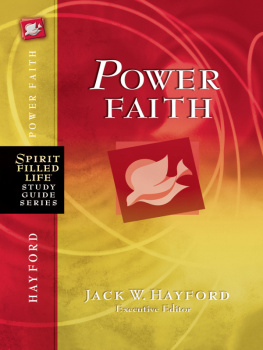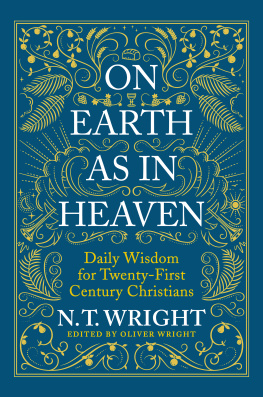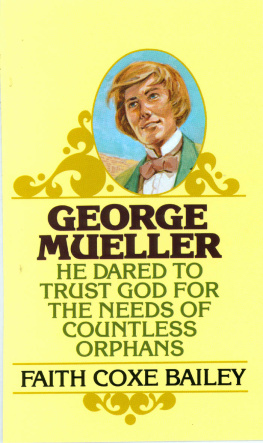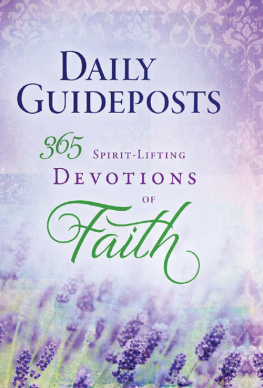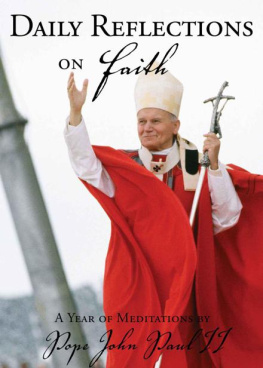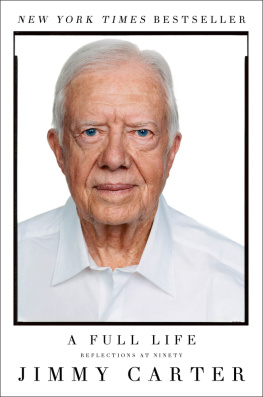The volumes in NCPs 7 x 4 series offer a meditation a day for four weeks, a bite of food for thought, a reflection that lets a reader ponder the spiritual significance of each and every day. Small enough to slip into a purse or coat pocket, these books fit easily into everyday routines.
Introduction
A blustery wind rattled the rickety windows of the inner city church sacristy, while a group of Sudanese refugees and I huddled against the cold. We were completing the reflections required for parents preparing to celebrate the baptism of their babies, and these parents were looking forward eagerly to next Sundays celebrations. I had taken time to prepare the process for the day. We would examine the theme of love by reading the parable of the lost sheep. The lesson of the story is, of course, obvious. God loves each of us so much that even if we stray, God will leave the ninety-nine in order to find the one who is lost. God loves each of us, uniquely and unconditionally. No matter how we might stray, God will seek us out.
We began reading the parable, and the parents listened with acute attentiveness. They loved hearing the scripture read aloud, since reading and celebrating their faith was often punished in Southern Sudan where churches were burned, villages destroyed, and Christians imprisoned and tortured. I learned many things from those newcomers to American life, perhaps most importantly, how to reverence and cherish the reading of the scriptures.
After the reading, I asked a simple question: What message do you think God wants us to hear in this text? Presuming that the answer would be some variation on Gods love and care, I had the rest of the process outlined.
One of the men answered. Its about faith, he said. Others in the group nodded in affirmation. Taken aback, but not wanting to betray my surprise, I simply asked why he thought it was about faith. In reply he offered not a metaphysical response but a story.
When I was in Southern Sudan, he said, the enemy came to my village. They captured me, and threw me in chains into a dark room. They made me sleep on damp concrete for one year. The soldiers would come and put electricity through me, and ask me if I was a Christian. Many times I thought they would stop if I denied my faith, but God gave me courage. No matter what they did to me, I said: I am a Christian. Finally, they became tired and let me go. I am alive; I am free because I said, I am a Christian.
As I listened, I realized that these people were looking at the parable of the lost sheep from an entirely different perspective the perspective of faith. While I interpreted the parable as a love story, they perceived it as a faith story. It was their story they were lost, tortured, alone, forgotten, and now were free. The birth and baptism of their babies was an exuberant celebration of new life that came from this persevering faith.
Opening the celebration of the fiftieth anniversary of the Second Vatican Council, Pope Benedict XVIs apostolic letter, The Door of Faith , invites Christians to reflect on their gift of faith. This book will use passages from The Door of Faith in order to focus our reflections. Over the course of four weeks, we will ponder our faith perspective, our faith conversion, Mary as a model of our faith, and our mission of faith. Like those Sudanese parents, it is hoped that pondering our Christian experience of faith might bring us new vision, new courage, new joy, and a profound sense of living faith in action.
To use this book, pray through the exercises day by day. Each day has a scripture passage, a passage from The Door of Faith, a reflection, and a spiritual practice. If you choose to pray the book over the course of a month, use one exercise daily. You might also choose to move more slowly, spending more than one day on spiritual practices that need a little more time. Enjoy the journey, and let us pray for each other!
Week 1: The Gift of Faith
Day 1: Reflecting on the Beginnings of Our Faith
When Paul and Barnabas arrived, they called the church together and related all that God had done with them, and how he had opened a door of faith for the Gentiles.
Acts 14:27
The door of faith is always open for us, ushering us into a life of communion with God.
The Door of Faith, 1
J ust imagine how happy Paul and Barnabas were to return to Antioch after their two-year missionary journey. There, the well-established Christian community had been praying for the two of them as they preached the Good News throughout Asia Minor. Pauls report of their journey was stunning Gentiles were listening and considering his message seriously.
In the Hellenized cities that Paul and Barnabas visited, the inhabitants had their own folk gods and goddesses as well as established Jewish synagogues. Even more importantly, they had astute and sophisticated philosophies. In Asia Minor, the novel message of Jesus had to compete with the time-honored, traditional writings of Plato, Socrates, and Aristotle.
Given this, it is not surprising that Paul and Barnabas were elated, even though their mission had limited success in terms of actual converts. Through their preaching, Jesus, an outlier from Judea, was now in dialogue with the Greek philosophical world. He had gained a hearing the door of faith was opened.
Spiritual Practice
Try to remember when you first were invited to consider belief in God. Did you experience this gift of faith in your family, among friends, through a church outreach program? Did a particular event prod you to open yourself to belief?
Today, spend some time recalling the beginnings of your faith. Whether weak or strong, your faith had a beginning. To become strong in faith, it is good to reflect upon and be grateful for this beginning. As you recall where and how your faith journey began, ask God to bless all those who fostered your belief, who taught you, and who encouraged you.
Day 2: Pondering our Faith Journey
Now faith is the assurance of things hoped for, the conviction of things not seen. By faith Abraham obeyed when he was called to set out for a place that he was to receive as an inheritance; and he set out, not knowing where he was going. For he looked forward to the city that has foundations, whose architect and builder is God.
Hebrews 11:1,8,10
To enter through the door of faith is to set out on a journey that lasts a lifetime.
Door of Faith 1
H uman life requires belief. If I drive a car, I need to believe that other drivers, for the most part, will stay in their lanes and obey the rules of the road. If I decide to get married, I am entering into a life of faith with another person. Marriage is indeed a leap of faith. On their wedding day, neither bride nor groom can prove that their relationship will last a lifetime. They can only make the leap of faith, believing and hoping that their marriage vows will endure. This trust, this faith in another person can be realized only day by day, year by year.



